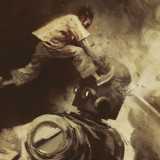Best of 2021
By galacticdonut 0 Comments
And you thought 2020 was a weird year to try and write an introductory paragraph for.
Games were still working as heavy-duty distractions for me in 2021, although things improved enough that I didn’t play quite as many as last year. After 8 years at *that place* I switched jobs! Moving into a completely new role with a lovely bunch of people, leaving some toxic management behind and moving house has turned out to be such a positive and I’m eternally lucky that it’s worked out the way it has.
Anyway, onto the list.
Shoutouts I didn’t get chance to finish
Opus: Echo of Starsong
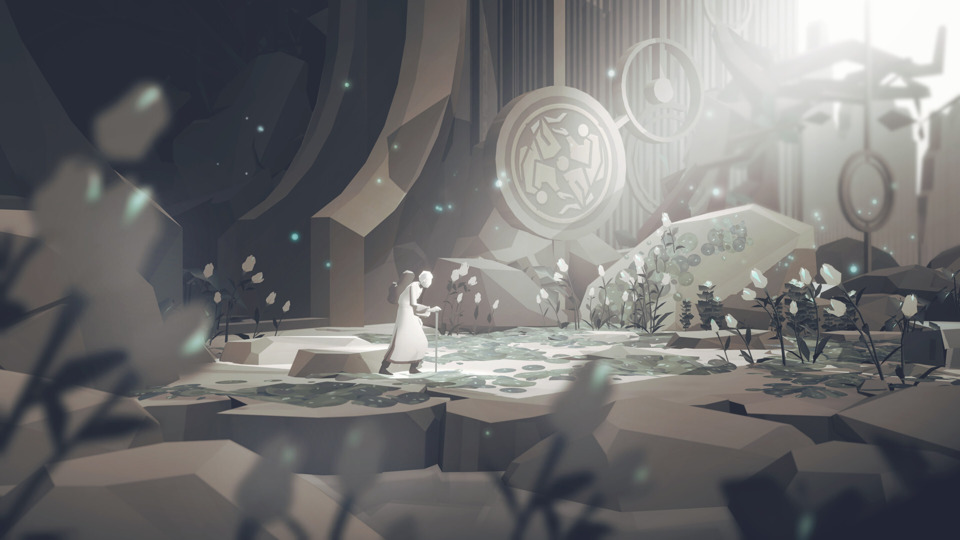
I’ve only managed a few hours in it, but so far it’s a very charming adventure-novel game that I get the feeling is absolutely going to have me emotionally ruined by the end of it, meaning it probably would’ve ended up high on my list.
It reminds me of 80 Days in terms of writing and decision making, with a little bit of resource management making you commit to where you’re going to explore, layered under a lovely soundtrack.
Special Nier Replicant Section
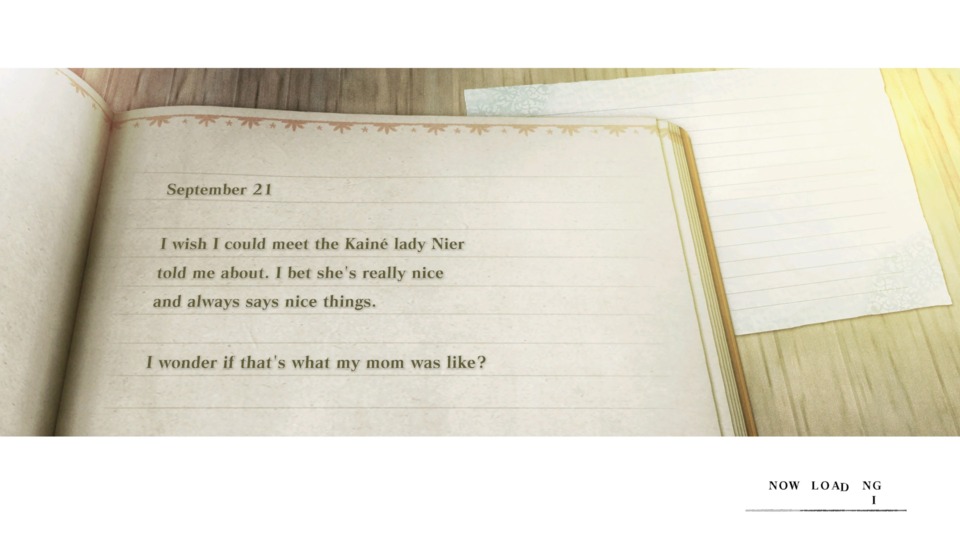
I decided not to include Nier Replicant on my list even though it has some (incredibly good!) additional story content because it feels like cheating. I have such an attachment to the original in nearly all aspects there’s no way it’d couldn’t be my number 1, so in the interests of every other game on this list it gets its own section instead.
It’s still amazing, except this time it’s much less of a chore to play (even if the “of-an-era” quest design is what it is) and I remembered all over again why I burst into tears at the Concert within seconds of that first track. The new Ending E hit really well, and underscored that it’s Kainé who is the strength of that game, not the protagonist.
No.12: Loop Hero
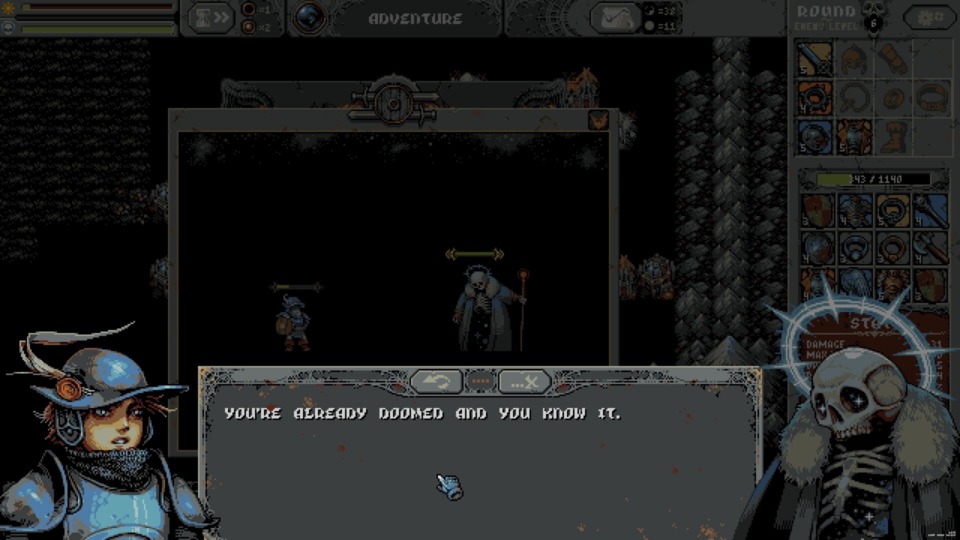
Loop Hero seemed to come and go very quickly for me, but it was one of those games that grabbed me pretty hard for the week or so I played it.
I’ve never been great at games that require using limited resources actively as part of the game flow, such as buying units in Advance Wars/Wargoove, because ultimately I am bad at that kind of decision making – meaning I managed to screw up quite a number of good runs by thinking I was in a good position to handle the Vampire + Village combo for 3 turns when I was…definitely not.
However when I wasn’t playing so terribly, I got a lot of satisfaction in trying out the different combinations of tiles and coming up with more and more optimal ways to streamline each loop the Hero had to traverse. Like a good deckbuilding game, it’s very fun to just click into a routine and watch my guy demolish anything put in front of him.
One of the other huge positives is the presentation of the game, having some truly fantastic pixel art & animations alongside a chiptune/synth/metal soundtrack that manages to put out the appropriate vibes depending on whether you’re resting at camp, traversing the loop or having a desperate confrontation with the boss where you’re willing your slowly-dropping health to hold out long enough to win.
That 45 seconds into Star Judgment is just perfect.
Soundtrack Highlights
https://www.youtube.com/watch?v=j3kriBoJA9I - Empty Ocean (intro)
https://www.youtube.com/watch?v=8Hj9vra5-pc Star Judgment
https://www.youtube.com/watch?v=QRM_iYhi14 - Universe's Storm
No. 11: Fights in Tight Spaces
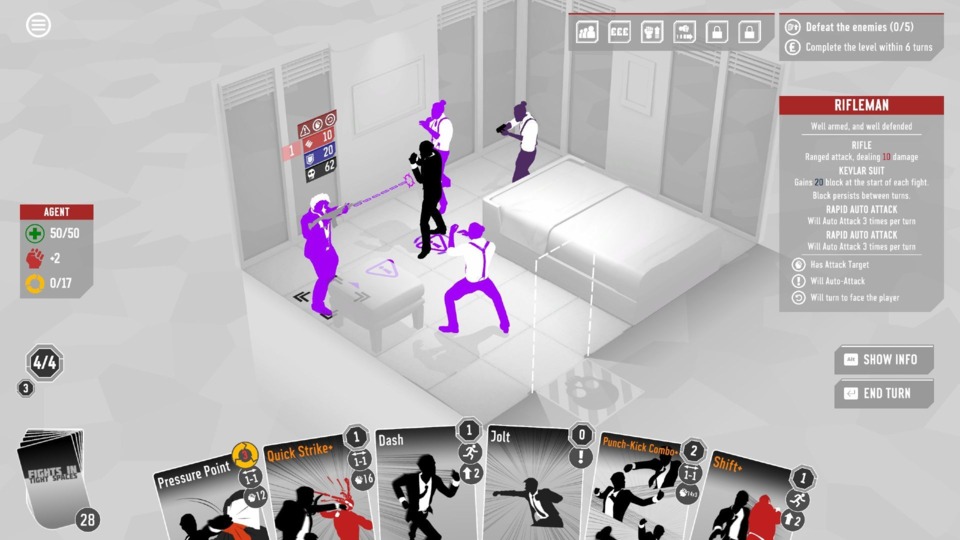
Ah, the Deckbuilder. Scourge of my work career long before the trend popped up in video games and another of those games where I tend to make bad decisions which tend to scupper my runs. The difference in my time with Fights in Tight Spaces is that the focus is arguably more on the grid-based combat, which I am much less terrible at.
The combat works in a similar fashion to Into the Breach, with your actions either doing damage or shifting character positions on a grid while the game overlays all the moves your enemies will take during the turn, letting you manipulate things to your advantage. This also lets you have that same endorphin rush of feeling like a genius when you set things up well enough to watch your opponents take each other out while you neatly slip out of the way.
Fights in Tight Spaces doesn’t do anything particularly ground-breaking, but it does provide a very clever concept that has been fine-tuned and lovingly worked on throughout Early Access along with a very striking (ha), minimalist art style, which the soundtrack does a good job of supporting without being too overbearing.
Deckbuilders have to have something really about them to get me into them nowadays, so it says something that I spent a very fun 30 hours playing and also managed to beat the final boss.
No. 10: Scarlet Nexus
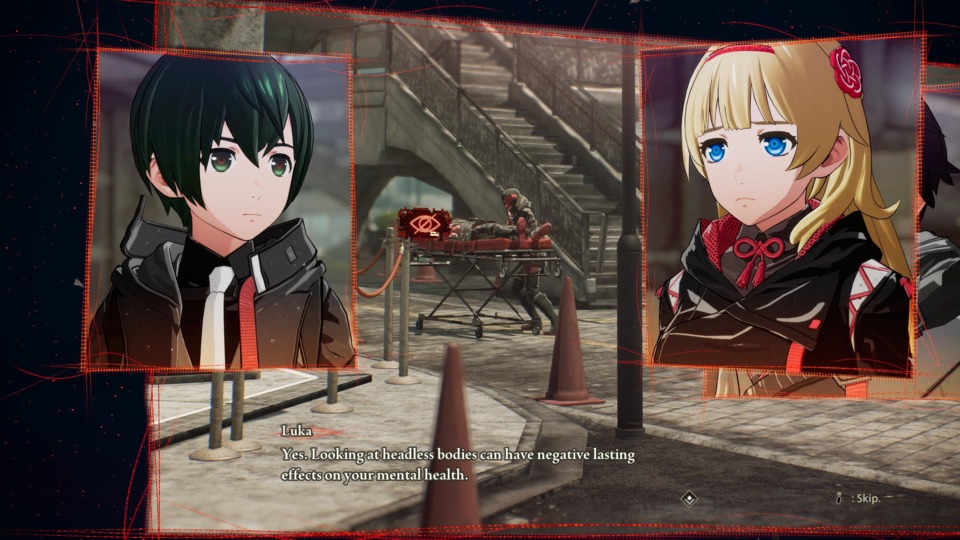
Scarlet Nexus is my first game in the very specific “Anime-styled game by Bandai Namco that had multiple ‘Tales of’ staff work on it that reviewed really well in the mainstream and I don’t fully understand why…” category this year.
Which isn’t to say I disliked it - I enjoyed it enough for it to make this list - but after playing these kinds of games year-in-year-out and usually enjoying them much more than the review scores tend to indicate, experiencing this weird kind of role-reversal was new to me. Which made it even weirder when it happened again later in the year for my Number 3.
Honestly, I think this feeling probably stems from an overdue piece about how the mainstream press perceives JRPGs. For the vast majority of RPGs I check out I know which outlets’ opinions align most with mine, so caring about the overall metacritic or whatever doesn’t factor into my purchase, but I’m usually the one looking past all the faults and defending the janky games I love - being on the other side of this fence twice this year just really threw me off!
Anyway, for the actual game itself, a lot of the positives people speak about when praising Scarlet Nexus are spot on. The characters are enjoyable, have distinct personalities and don't (for the most part) boil down into one-note tropes, which makes it all the more obvious there's some Tales influence in here as character work has always been that series’ strength.
I found the combat a little clunky to begin with, but as it opened up it became a lot of fun layering all my Teammate's powers on top of each other and I had fun using them in various combinations to take advantage of the status effects.
The story is kind of...there, but does a serviceable job pushing the plot along even if there are a lot of nonsensical moments that likely suffered due to different information being dished out on the separate Yuito/Kasane routes. That's not even counting the bizarre justifications they need to invent so you can meet up with members of the other team for your 'Social Links' (which themselves are pretty solid) - One minute they're trying to kill you and the next they're inviting me for coffee to chat about cooking??
Despite that, the general style of the world kept me interested and the soundtrack shined in its dungeon/area themes, shifting surprisingly well between orchestral and electronic tracks that stuck with me a little more than I thought they would. Considering it’s Hayata Takeda’s debut soundtrack it’s even more impressive.
I'm still pleasantly surprised Scarlet Nexus reviewed so well, which is only a good thing as I'm all for more games like this being made.
Soundtrack Highlights
https://www.youtube.com/watch?v=Vxuai5FaacE - A Hidden Taboo
https://www.youtube.com/watch?v=97Ogwl1tpD4 - Grab your power by yourself
https://www.youtube.com/watch?v=X844XfSLMZ4 - My Sweet Hideout
No. 9: Cyber Shadow
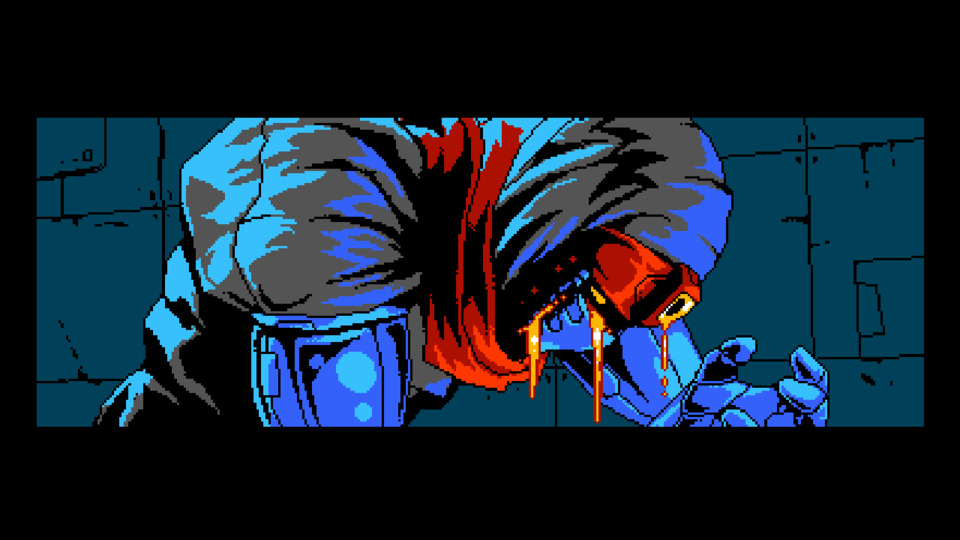
The first of many games I tried out this year thanks to Game Pass, which turned out to be one I easily would’ve bought outright if I had to.
Cyber Shadow wears it’s inspiration on its sleeve, with comparisons to the original Ninja Gaiden coming up pretty often in reviews and while it’s difficult not to reduce it to just a modern version of that game, Mechanical Head Studios have made an excellent modern version of that game and then some.
Other than the initial stages being the weakest couple of levels, once I got into it I found it hard to put down. The difficulty was just the right level of challenge for me, having some tough sections that rewarded player skill but also utilising a neat checkpoint system where you could spend currency to revive with bonuses if you needed to.
It does gradually get more difficult as you go though, and as you gain more abilities the level design ramps up to accommodate. The boss fights were the standouts in terms of design and complexity, but I had a really fun time with them despite the repeated deaths. Well, except for the one where the optional challenge is to not touch the water because…oof that took a lot of tries.
Like Loop Hero, it’s another game with impressive pixel art, pulling again from the 8-bit era style of single-frame cutscenes with some animation and camera panning to pull it all together, which is also backed by a very catchy soundtrack. If you’re going to one-up Ninja Gaiden in everything else then you have to bring the music too, and Pentadrangle delivers with what was almost my favourite OST of the whole year.
Cyber Shadow surprised me with how invested I got into it, enough to pick it up again immediately after beating the final boss and take on all the optional challenges. Calling it a modern Ninja Gaiden might seem to be a bit reductive, but I think it’s pretty accurate – and hey, Ninja Gaiden is a damn good game!
Soundtrack Highlights
https://www.youtube.com/watch?v=IiP7tVkYQ34&t=446s - Stage 1 | Geothermal Towers
https://www.youtube.com/watch?v=IiP7tVkYQ34&t=1808s - Mekacity Ruins
https://www.youtube.com/watch?v=IiP7tVkYQ34&t=7888s - Apparitor v2
No. 8: Hitman 3
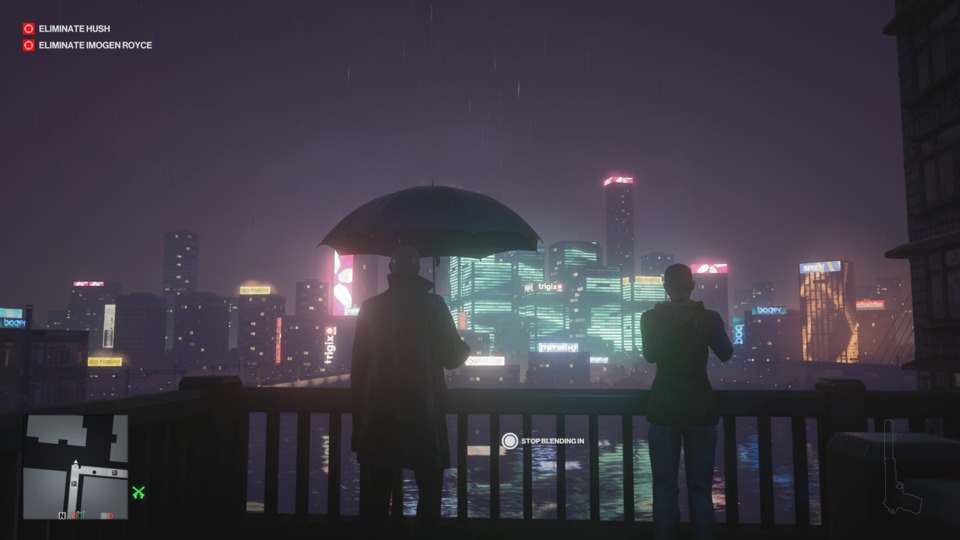
It’s Hitman again, you know what it is. The previous two games were a whole bunch of dumb fun and the third manages to continue that tradition while also coming up with a couple of the best levels in the whole series.
While there are some additions that didn’t really work for me (such as using the camera accessory), the Berlin and Dartmoor levels are probably the two peaks of the game for wildly different reasons.
The first is a great twist on the formula, where for once you don’t know anything about the targets, or even how many there are, which provides a markedly different feel to the game. The way that level also starts with a very minimalist approach adds to the tension, and it showcases how IO have improved their storytelling over the series by weaving in these narrative moments without detracting too much from the gameplay you’re mostly there for.
Dartmoor’s strength on the other hand is the exact opposite, leaning fully into their very self-aware storytelling enough that they crafted an entire murder mystery for the player to engage with – if they choose to – where you can literally play a detective and figure out the circumstances of what ends up being quite a decent plot.
In some ways I feel happy that IO will move onto a new title, with Hitman 3 feeling like the most they could get out of the trilogy with Agent 47 and the engine they’re using, as it’s a very satisfying ending to this current run of games - I even really liked the final level that divided a lot of people.
No. 7: Ys IX: Monstrum Nox
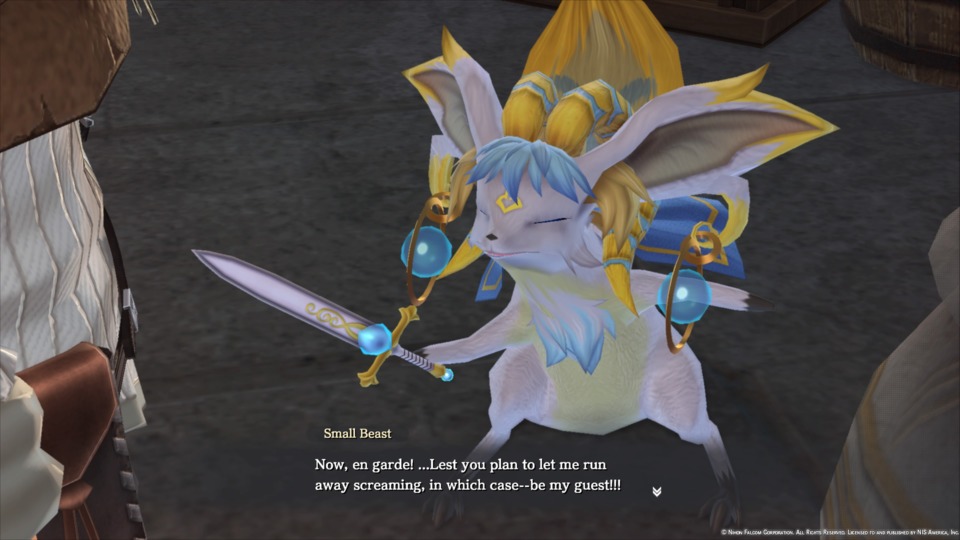
Ys IX was always going to suffer from not being Ys VIII, which came out of nowhere that year and was a game I ended up absolutely adoring, but it’s still a solid entry in the series that I enjoyed quite a bit.
IX still has a lot of the usual Ys trappings that make the games so fun - Violin & synth focused power metal, extremely fluid combat and just a sheer sense of speed, whether you’re bouncing around in a combat encounter or racing around town – which makes it hard for me not to enjoy.
The traversal mechanics added in IX are very fun to use, even if they’re hamstrung a little by the game design in order to stop you fully breaking their environments. Being able to run up walls to the top of a building, jump off and then glide through the sky feels extremely liberating when you aren’t encountering lipped roofs every 2 minutes to stop you doing exactly that.
The town setting and environment is probably the heart of why IX didn’t hit as well as VIII for me, due to the aforementioned clunkiness of the traversal and overall more claustrophobic feeling to the place compared to the Island setting of the previous game.
I found the story serviceable, with a couple of standout characters (though none on the level of Dana in VIII) and appreciated a lot of the surprising callbacks to older Ys games, which did a lot to get me playing through the games I’ve missed previously.
All that said though, the music still kicks ass in the way Falcom does and man is it still fun to zip around doing perfect dodges and guards in combat. Any game that gives a good Witch Time equivalent when you time a dodge correctly is great in my book.
Soundtrack Highlights
https://www.youtube.com/watch?v=nTJNYniviRw - Norse Wind
https://www.youtube.com/watch?v=m-IUKWVP5DA - The Cave of Groan
No. 6: Persona 5 Strikers
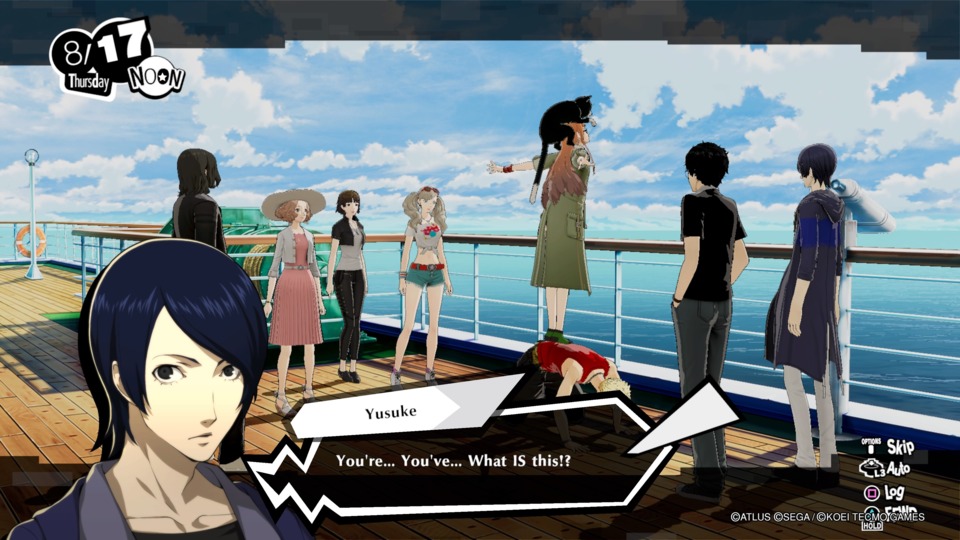
I wasn’t sure initially if I was going to like Persona 5 Strikers, having little experience or love for Musou games, but it turns out spending 120+ hours with a bunch of likeable characters in the past and then playing a game that has much better writing than Persona 5 goes a long way. I did struggle initially with the combat and had to spend a little more time than I liked finding some tips on how to play, but I did eventually get the hang of it (and never went above Normal difficulty…).
Strikers is for intents and purposes a straight up sequel to P5 and benefits greatly from having an already established cast and no social links, which enables it to give a lot of time to characters that didn’t get as much focus in their debut game, which was one of my main criticisms at the time.
The initial design to focus on 1 specific character in each of the opening 3 levels was a smart choice. Yusuke and Haru especially benefit from getting a lot more characterisation this time around, and both of their stories in particular I thought were handled really well.
An even smarter choice was to veer away from the character-per-level formula just as I started to think “oh the structure is just like P4 and P5 I see how this will go” and then drop me into one of the most creepy/tense dungeons I think I’ve played in a modern Persona game. Maybe because they weren’t restricted by the ‘Persona Formula’ of storytelling but with Strikers they managed to tell a surprisingly tight and emotional story in a way that, alongside the new semester content in Royal, continues to give me hope that they’ll be able to bring some solid writing into P6.
It’s not just expanding on the original cast that’s enjoyable though, both of the two new characters are fantastic, from Sophia’s childlike optimism and energy to Zenkichi’s development from world-weary (very relatable) adult to a renewed man. Heck, they not only made me like a cop in this game, but made him into one of the best characters, which is no small feat.
I haven’t even mentioned the soundtrack, but it goes without saying it’s fantastic. The remixes and variations on the original P5 music are well-done and a lot of the new music holds up just as well, especially the themes that provide a bit more of a subdued atmosphere to the latter dungeons where everything isn’t quite as “upbeat heist movie” as it is in P5.
Musou games still aren’t my thing, but if a game is as enjoyable as this then I’ll give it a shot no matter the genre.
Soundtrack Highlights
https://www.youtube.com/watch?v=b4c-FrJGEHI - Singularity
This plays during the creepy/tense dungeon mentioned earlier
https://www.youtube.com/watch?v=_fmmAUbJkMo - Jail in Abyss
https://www.youtube.com/watch?v=6anN6B2sVCY - Demiurge I: Exodus
No. 5: Psychonauts 2
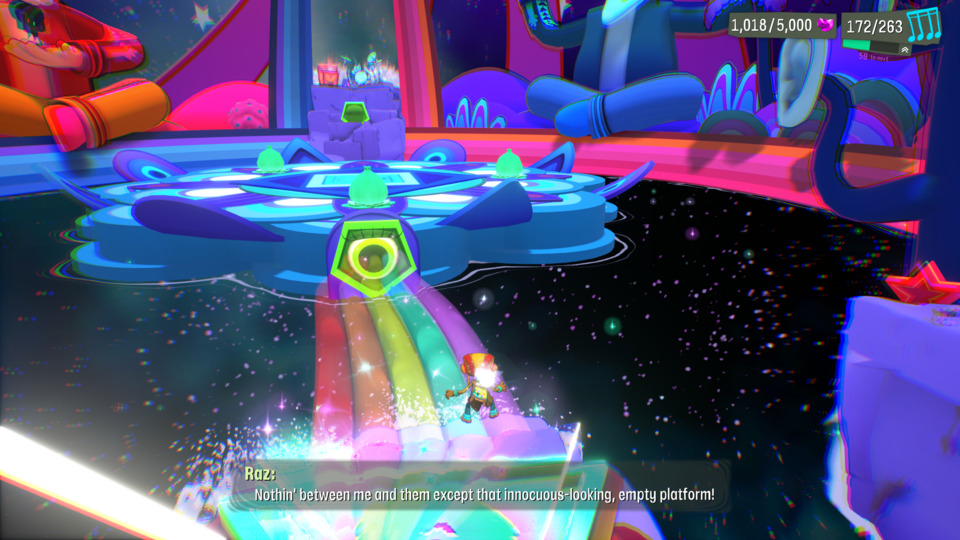
Nostalgia goggles for video games are a hell of thing, I think even more so for the ones we played at certain times of our lives. For me there’s a period from being at Uni through to my mid-20s where I played a few games that really stuck with me thanks to where I was in life - Tales of Symphonia and Persona 3 are the two big examples, and the 3rd is the original Psychonauts. Heck, my Xbox username is literally one of the characters from it.
I’ve found with games that I’m attached to, the longer it goes without a sequel the less chance any subsequent follow-up is going to live up to my nostalgia-fuelled expectations – so given everything Psychonauts 2 has gone through to even get made, including 15 years of my own life happening in the meantime, I was fully prepared for it to be fine if not amazing and just be grateful it came out at all.
Turns out, Psychonauts 2 is wonderful, and lives up to exactly what I wanted from a second game. I genuinely spent the majority of my time with a massive smile on my face thinking I’m so glad this got made and on top of that, Double Fine not only managed to get the game out but also improved on the original in nearly every way.
The creativity of the level designs are once again spectacular in both their appearance and imagination, pushing forward the very personal themes of the mind you’re exploring. The bowling alley, PSI-King’s concert, Fatherland Follies and Compton’s mind are all inventive and yet very different from each other, with Compton’s 80s themed gameshow probably being my favourite, complete with snazzy theme tune and “fabulous prizes”. There’s so many small touches in each area I found myself stopping and deliberately looking at even the smallest parts of the environments.
One thing I appreciated was that Psychonauts 2 also manages to tell a very touching story around both trauma and mental health, whilst also navigating those topics with a lot of care and not devolving into tired tropes, which is most definitely helped by the strength in writing and stellar voice acting. Peter McConnell’s soundtrack also does an excellent job fitting the mood to whatever is going on, from light-hearted exploring of the campgrounds to moody, spy thriller-esque guitar tones, to the bombastic fight scenes.
I initially approached the game with some trepidation, wondering whether those characters I loved from 15 years ago would still be interesting. 5 minutes in and the whole set-up in the introduction had me burst out laughing once I realised what was going on; It was like I was just picking up where I left off so many years ago. They really nailed it.
Soundtrack Highlights
https://www.youtube.com/watch?v=lNfVrsh-Kr4&t=1088s - Intern Hazing
https://www.youtube.com/watch?v=lNfVrsh-Kr4&t=2747s - Introducing Gristol’s Mind
No. 4: Lost Judgment
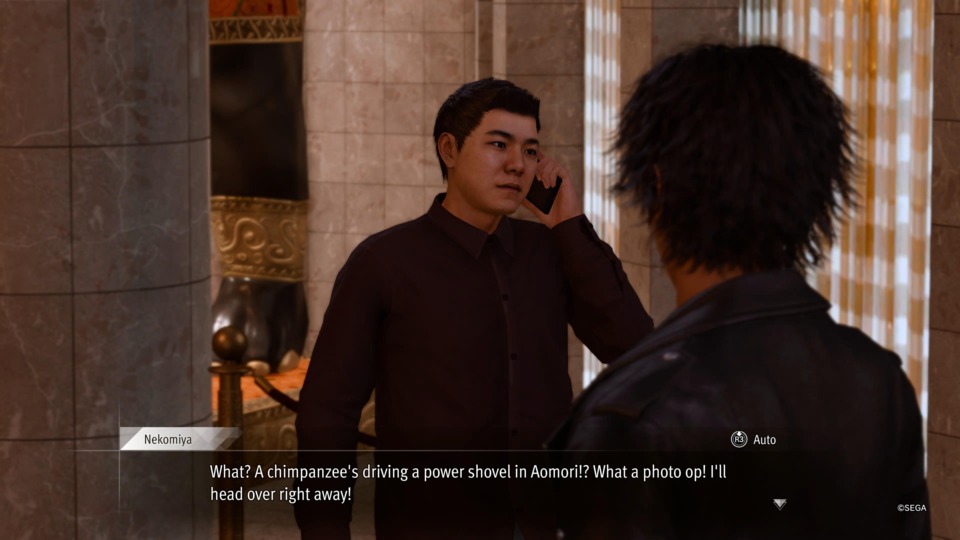
Whenever I think about this game, I literally have to stop myself from playing 2 very specific tracks from the Lost Judgment soundtrack because they’re incredible. I don’t think the OST is even in the top-end of Ryu Ga Gotoku games overall, but man if it doesn’t have some moments of pure HYPE, which in a way rather sums up the game as a whole.
(And while writing that paragraph, yes, I immediately put those two tracks on…)
I enjoyed Lost Judgment a lot, but I’m still undecided whether I prefer it to the original. Mechanically it’s an improvement over the previous game, with the addition of the Snake style finally letting me truly enjoy the combat in these games and not feel like I’m actively fighting against the controls or cheesing EX move strategies to take down the bosses.
There’s still the usual wacky sidequests and trappings to go along with the main plot, though much of that was put into the school sections rather than out in the world, which work to varying effectiveness. The Dance Club and Skateboarding portions were both fun and had some interesting story beats, while the Robotics Club and Biker Gang portions I found were narratively quite appealing but a bit of a slog to get through.
That said, the entire Professor storyline I felt was really strong, with Amasawa the Schoolgirl Detective being a legitimately fun character and the two main arcs involving her had a very satisfying conclusion.
Where the original Judgment had a more interesting Main Story to me, reaching a level of intrigue and tension that its sequel doesn’t quite hit, Lost Judgment has some superb moments and individual characters that leave an impression. Plus, it has a much more morally ambiguous antagonist, which makes the fights involving them take on a much more nuanced tone than just beating the crap out of the bad guy (although there’s plenty of that too for your catharsis).
That’s not to say the overall story isn’t compelling, there’s some good writing around the parallel cases and for the most part the game handles some of the potentially sensitive stuff with enough grace that it doesn’t lose its effectiveness, covering things like sexual assault, suicide and bullying without falling too badly into dangerous stereotypes.
Like the last few RGG games, I have to give another shoutout to the localisation – the effort put into the translation and voice acting is once again excellent, enough where I’m all-in on the English voices for the Judgment series. Scott Strichart and the team putting in some work there.
I could probably write another 3 paragraphs just on the characters alone. Kaito is the best ex-Yakuza buddy I never had, they do a good job of fleshing out Tsukumo a bit more and did I mention the antagonist is great? It says something when I’m nearly at the end of the game and I’m still not exactly sure they’re completely in the wrong.
Even if I think Lost Judgment barely falls short of the original, an average RGG game is still a great game.
Soundtrack Highlights
Spoilers in the Youtube comments!
HYPE track 1: https://www.youtube.com/watch?v=c-1tRRnBmpc - Dig in Your Heels
“Stop them?”
“Nah, they’ll tire out eventually. Think of it as another means of communication, y’know?”
The second fight with your rival and the first real one where you know their intentions and more about them. After many hours of petty back and forth and build-up between the two characters this is the first direct confrontation where you both decide to throw down and holy shit does the intro to this track set you up for what’s coming.
HYPE track 2: https://www.youtube.com/watch?v=RH76mSTOCc8 - Final Destination
Unlike the Yakuza series, Yagami isn’t a near-unstoppable powerhouse like Kiryu, so while you go through a lot of fights he doesn’t tend to go through lots of foes at once.
During the finale, the only way to reach the final boss is through all of his goons, where you roll up with your 3 buddies, in the pouring rain and systematically fight your way through virtually every single thug left in the game while this absolute banger of a track plays.
It’s even better that it’s a remix of a track from the original Judgment, which played when you ran a similar gauntlet in the finale of that game fighting your way through the police.
HYPE track 3: https://www.youtube.com/watch?v=fzqx7Dp3a8Y - Unwavering Belief
The second, and final fight with your rival mentioned above. The culmination of everything that went before, using the leitmotif from ‘Dig in Your Heels’ to set up a sombre but emotional fight, which somehow manages to kick up a notch halfway through the track as you reach the final phase of the fight. I love me violins, guitars and a good leitmotif.
No. 3: Tales of Arise
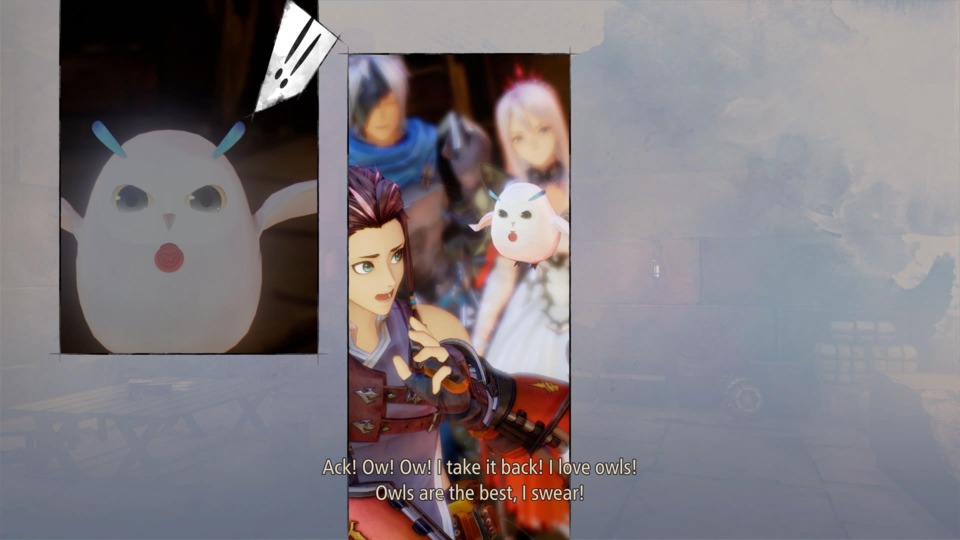
Taaaaaaaaaaaales!!
There’s no denying I love these games to death, despite their shortcomings, so regardless of quality I’m still grateful we’re past that mid 2000s period where some titles didn’t get English localisations and even if they did, they didn’t make it outside of North America (such as the best one, which eventually got here via the 3DS five years later).
Arise is a landmark title for Tales in a lot of ways, being the first simultaneous Worldwide release in the series, the first to use an external engine (Unreal) and probably the first that had an actual marketing budget attached to the project, which was a very nice surprise leading up to release - presumably Bandai Namco noticed that Scarlet Nexus sold quite well after they dabbled in a bit of advertisement there.
So how much did I enjoy Arise? Quite a lot! Enough to put it at number 3 here, but with the caveat that like Scarlet Nexus, it’s very weird to be on the other side of the mainstream review zeitgeist. This game is the second one in the very specific “Anime-styled game by Bandai Namco that had multiple ‘Tales of’ staff work on it that reviewed really well in the mainstream and I don’t fully understand why…” category.
For some context, the PS5 version of Arise is currently sitting at an 87 Metacritic from 75 reviews. Let alone there’s the fact that 75 outlets reviewed a Tales game, an 87 makes it the best reviewed Tales game ever, even ahead of fandom-favourite Tales of Symphonia. Yes, yes, like I said before, the Metacritic numbers don’t affect my purchasing decisions, but for a long-time fan who thinks Arise is maybe Top 5 in the series at best, it’s a bit weird to take in!
Anyway, my existential review-dissonance crisis aside, despite some balancing issues with the boss encounters and some very wonky pacing in the back third of the game – which to be fair, is very much a Tales staple – Arise is a huge step up from many of the previous games.
First off, it’s gorgeous. The change to Unreal has obviously helped but I’ve never stopped this many times in a Tales game to stare at the view, and that’s saying nothing about the spell animations. Even the detail on the costumes and lighting effects on the weapons look stunning, which appear even better in motion.
The combat too feels extremely fun, even if you stick to Alphen for the whole game and it clearly takes some inspiration from Graces, which has the most popular battle system within the hardcore fans. If I’m being critical, it would be nice to have a way to cancel out of some of the lengthier animations, but honestly I had so much fun dodging around, teleporting to the next enemy and calling in Boost Strikes it kept me going all the way to the end of the game.
Characters have always been the Tales series’ strong point and Arise has some pretty good ones in the playable cast. Alphen is one of the more memorable protagonists that doesn’t just tick the “earnest hero” box and Dohalim is just a delight in every sense, where I feel he really shines in the (slightly too infrequent) comedic skits and more light-hearted side content.
Looking back, that’s one of the few disappointments I had with Arise compared to previous games, in that there’s not really a lot of chance for the cast to breathe. The plot moves at such a breakneck speed through the first 2/3rds of the game that on one hand it does a very good job driving the cast forward, keeping you engaged with the story much earlier and harder than in other Tales games. On the other though, there’s so little downtime the cast have few opportunities to interact without it directly involving the main story – leaving the group camaraderie feel a bit less natural compared to other Tales games.
Whenever they do get to relax and add some humour to the game though, I found myself laughing a lot more than I thought I would. The “owl translation” conversations between Alphen and Shionne may be one of the funniest skits in the whole series, helped out by an exceptional localisation and voice acting (Ray Chase and Erica Lindbeck in particular). Oh and speaking of owls, Hootle is the best mascot in the series and I will fight anyone who says otherwise.
I have to stop writing, because otherwise this will continue for another twenty paragraphs, but some other positives I had:
- The soundtrack is solid! Sakuraba doesn’t hit the heights of some of his previous work but Arise is one of his better efforts and it does have one of the catchier standard battle themes in the series.
- The post-game cameos are always fun nods to the fans in Tales games and without spoiling who it is in this one, I genuinely teared up seeing 2 characters interact and find some closure that they weren’t allowed to have in their own game. They got me good.
Anyway, my weird fandom-feelings on the series aside where I can’t help mentally comparing Arise against the 16 prior games, I’m extremely happy to see a Tales game get some critical acclaim and sell so well. It’s an earned reward that’s been a long time coming and knowing that they’ll likely get more development support from Bandai Namco is the best thing that could happen. Even if the next title doesn’t live up to Arise with the next set of reviews, just seeing the leaps and bounds they made here is enough to give me confidence in the series continuing and honestly, that’s all I need.
Soundtrack Highlights
https://www.youtube.com/watch?v=0OQZxp0LMcg&t=109s -Flame of Hope
https://www.youtube.com/watch?v=0OQZxp0LMcg&t=1724s - Ice Moon (Scar)
No.2: Death's Door
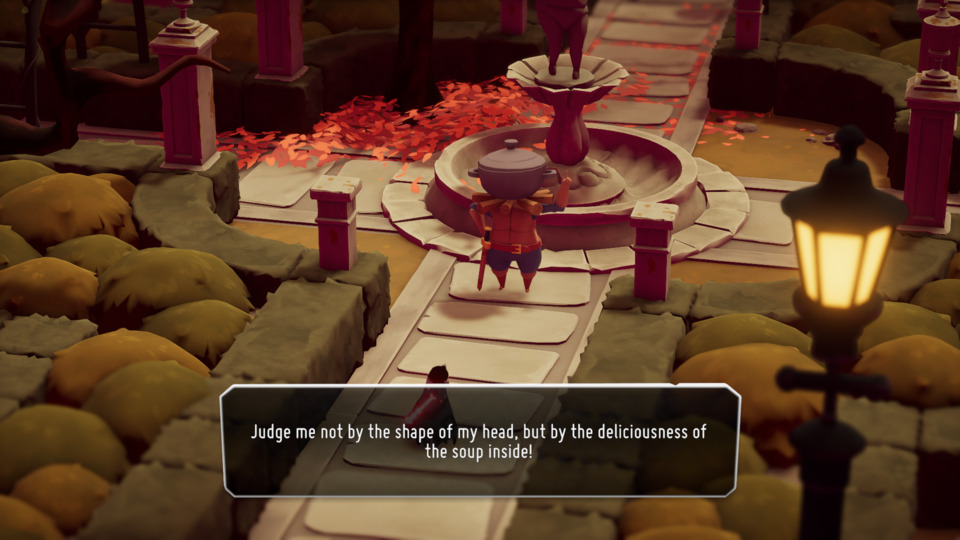
Before Death’s Door, I’d only played 2 games that included a track titled “Grandma” on their respective soundtracks - NieR and NieR: Automata – and if that information doesn’t immediately tell you how much I enjoyed Death’s Door and how much influence the soundtrack had on my experience with it, then read on.
On it’s face Death’s Door is a rather charming isometric action-adventure game, with a little bit of Zelda (exploring, dungeons and getting new abilities) and a little bit of Souls without the penalty for dying (slashing + dodging gameplay, asks the player to explore on their own initiative, a bit of environmental storytelling). However, the game really carves out its own personality that really grabbed early into my time with it.
There’s a both a wonderful melancholic vibe to the experience and some surprisingly joyous bits of humour peppered throughout the game, which come together really well without feeling tonally disparate. It’s hard to understate how much I enjoyed the tone of Death’s Door - it’s warm, it’s funny and it’s sad in all the best ways and the music is just as important to evoking those feelings as anything else.
It’s a beautiful soundtrack, playing wistful melodies as you explore crumbling ruins, to sharp orchestral tracks while fighting bosses, to airy piano themes while high up in the sky. All the tracks just fit their environments so well and it really ties you in emotionally. Even the smaller touches and music stings are effective, such as every boss fight having a ‘title card’ introduction with a audio flourish before breaking out into their individual combat themes.
Speaking of which, in a Dark Souls comparison that isn’t just ‘Game = Hard’, there are some boss fights that are surprisingly touching - especially if you take the time to inspect certain items and let yourself get invested with their arcs. My favourite fight was an optional, post-game encounter that would be massive spoiler territory to talk about, but their character, build-up to the fight and resolution was just…incredibly moving.
Right from the start Death’s Door does a really good job giving some personality to its characters, even if over the course of the game they don’t get tons of dialogue, such as the NPCs in your office. There’s the rather lax head of security “Baul Plart”, Agatha who just *loves* typing, Chandler the Handler who hates paperwork with a passion and that’s not even getting into the characters you meet out in the world – the bosses being the most memorable, who get a lot more dialogue and backstory than you’d expect.
I haven’t even spoke about the combat, a deliberate but effective slash-and-dodge system that provided just the right amount of challenge without being punishing when you die, besides going back to your last checkpoint, with some of the optional fights upping the difficulty to really test your skills.
Death’s Door was a wonderful 14ish hours and one I 100%ed, immediately dropping back in after the final boss and collecting the rest of the items, completing the post-game and getting the true ending, purely because I was so invested in the world, I wanted to know about every last bit of it. After doing some reading about it afterwards I can only imagine how this game blew the minds of the audience that played Titan Souls, the developer’s previous game.
Maybe the exploration of death and acceptance in this game hit me harder due to everything that’s been going on currently, but it left me feeling really positive afterwards. What a lovely game.
Soundtrack Highlights
https://www.youtube.com/watch?v=ABXm4F0G2G8 - The Gravedigger’s Heart
Steadhone the Gravedigger is such a lovely character, one who performs eulogies for the deceased yet feels his own sorrow at being unable to die himself. He’s such a calm and kind person, and his theme captures that so well.
https://www.youtube.com/watch?v=Bu5ZGrijwAM - The Old Watchtowers
Traversing through an old settlement high up in the mountains, nearing the end of your journey as the wind rushes past and you zip through the air. At this point in the story there’s been a change in tone for your journey, with more of a focus on freedom and this is another track that just nails that feeling.
https://www.youtube.com/watch?v=QOYgn46rvEY - Avarice
On the opposite end of the spectrum, this is a Boss theme for going through a gauntlet of enemies and I looked forward to this track every time.
No. 1: The Great Ace Attorney Chronicles
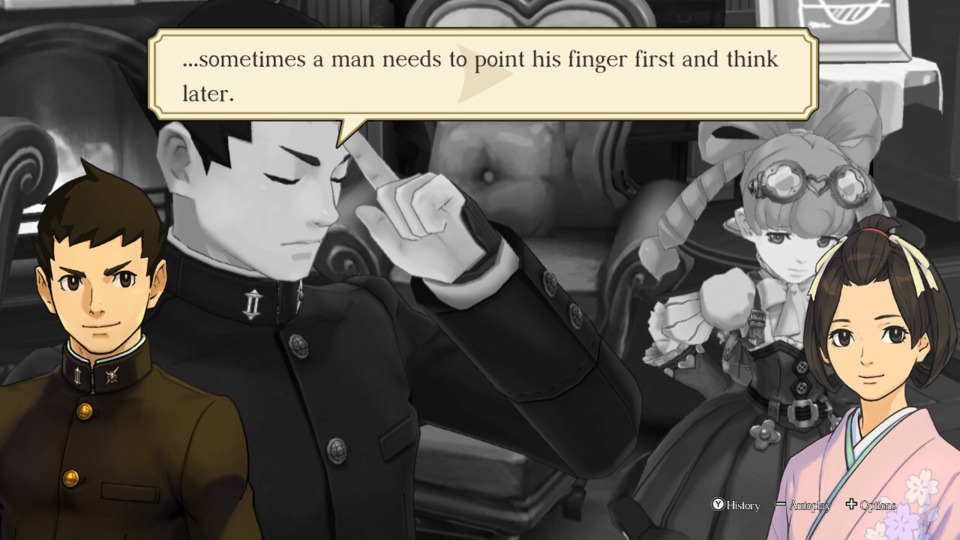
In 2019 I put the excellent Scarlet Study fan-translation of the first Great Ace Attorney on my list because I and most of the fanbase had accepted the chances of it getting an official translation were slim to none. I even said at the time, “this one is never getting an official English release”.
Well, something good did happen in 2021 after all. We not only got an official translation, but got both parts of the duology, letting me finally find out all the things they left on a cliff-hanger in that first game. And you know what? I think The Great Ace Attorney Chronicles gives the original trilogy a real run for its money as my favourite in the series.
I replayed through the first game again as a refresher on all the little plot details and references these games love to utilise later down the line, and to familiarise myself with the official translation, and looking at what I wrote back then it all still holds up.
The characters are superb, it’s funny, it has revelatory plot twists and all-in-all has a lot of the traditional strengths of the series. Susato remained my favourite character, and favourite assistant in the series, with her intelligence and composed demeanour being a great counterpart to Ryuunosuke's jitteriness. She also repeatedly stands up for her beliefs and becomes a strong female character in one of the more hostile settings these games have had.
Holmes Scholmes is a joy every time he’s on screen, the dance of deductions are fun to go through and each of the cases are solid, both in their self-contained plots and their references to the overarching narrative that comes together nicely by the end of this first game.
I’m always cautious about my expectations of games in a series that have been Japan-only for so long, as the circles I run in tend to hype them up quite a lot. With Trails it was the Crossbell saga, for Tales it’s been Tales of Rebirth and even previously with Ace Attorney it was Gyakuten Kenji 2.
As it turns out, Gyakuten Kenji 2 really is a great game, so moving into GAA 2 I was optimistic that the fan-opinion wouldn’t let me down and they were not wrong.
It’s so good!
GAA2 hits all the usual Ace Attorney strengths, turns them all to 11 and then decides to subvert some for the long-term fans just to keep you guessing. It really felt like a lot of Shu Takumi’s best work, while bringing inspiration from the original trilogy with some freshness to it.
So much of the enjoyment I had with the game came down to those story moments that writing them here would be huge spoilers, but the greatest feeling for me in an AA game is being oblivious enough not to spot the twist until right before it happens, and oh boy did the game do that, no more so than the final case.
It’s also a game where I enjoyed every case, even if the 4th one is basically the preamble to the 5th one and there’s so many amazing character moments, I felt like I was hitting the screenshot button every 5 minutes because I’d be giggling at whatever was happening on screen or going “I get that reference!” to a callback to any of the previous games.
That’s only the side characters too - Hosonaga, Soseki, Shamspeare, Professor Harebrayne and so many others were great additions around the core cast, who also got a lot of development in the second game. It was satisfying seeing Van Zieks get his character fleshed out more, especially with the revelations in the last case (moment of the game for me) and he’s another where he’s up there as one of the best prosecutors in the series.
Staying with the core cast, I am a sucker for the ‘goofy/lazy/dumb genius finally gets serious’ trope whenever it comes up in media, and one of my favourite parts of the game is watching Holmes taking off the kid gloves for his final dance of deduction, with the music becoming a more triumphant version of the original dance theme and you suddenly realise what he’s been doing all along. What a guy.
Music does this a lot throughout the game, building on themes from the 1st game and adapting or building on them for the second as a character’s motivations or circumstances change. It’s a really clever and effective thing for those who catch those references, although sadly spoiler territory again for the best examples.
I mentioned subverting some of the usual AA tropes earlier and they also do an incredible twist with the music too. In all the games so far there’s a ‘Pursuit’ theme, which is usually the “I’ve got you now” heart-pumping music where you’re making progress on the villain.
In Case 3 of the second game, 8 cases into the duology and never done before in the entire series, they play a variation of the game’s pursuit theme as a prelude, right as you realise one of the cases’s big twists, giving a lead-up to the ‘gotcha’ moment with the full-on triumphant main theme. It sounds like such a small thing, but it caught me completely off guard, and got me so hyped up knowing that ‘gotcha’ moment was coming. And then they did it again in the final case!
You don’t get the same feeling in these games without the music, it’s so good.
This is another game where I could write another 1000 words without trying, but suffice to say it’s the best 70 hours I spent this year, not even including the lengthy back and forth I had with a good friend where we traded stories of our favourite parts.
It’s the very best of that ‘classic style’ of Ace Attorney, with humour, tension, tears and “oh shit” moments galore and it’s the game on this list I just could not stop playing in order to see what was going to happen next.
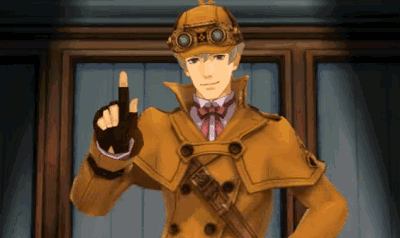
Soundtrack Highlights
https://www.youtube.com/watch?v=smtc8Sucfm8 - Sherlock Holmes ~ Great Detective of the Foggy Town
Sherlock’s main theme, a jaunty violin melody
https://www.youtube.com/watch?v=JWicR0c7sv8 – Prelude to Pursuit
The prelude theme I mentioned earlier, before it kicks into the full theme:
https://www.youtube.com/watch?v=bAtJnMEUkQs - Great Pursuit - The Resolve of Ryunosuke Naruhodo
The big, final “gotcha” track of the game, using all of the AA bonkers powers of lawyering to take down the antagonist.
